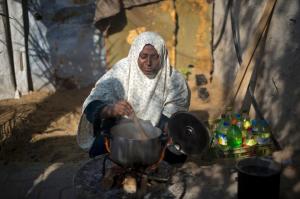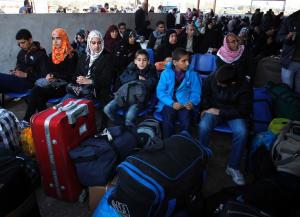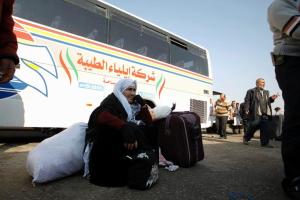It was the publicity stunt of the year in Hamas-ruled Gaza: the
delivery of Kentucky Fried Chicken from a branch in Egypt through a
tunnel under their shared border.
But
since the service was launched in spring, the Hamas-friendly Egyptian
government of Mohamed Morsi has been toppled in an army coup.
And
since then, Egypt's military has destroyed hundreds of the tunnels,
sending the takeaway orders into free-fall with the rest of Gaza's
economy, already squeezed by trade restrictions imposed by its other
neighbour, Israel.
In Rafah, the sprawling city which straddles
the Gaza-Egypt border, the dust raised by hectic smuggling activity has
settled in the wake of the Egyptian army's campaign against the tunnels.
Just
a few scattered diggers are working under tarpaulins covering the
entrances to abandoned tunnels, excavating "for the future".
"Is
there a future for tunnels? Not with Sisi," sighs a Gazan border police
officer, referring to Egyptian military chief General Abdel Fattah
al-Sisi.
The
flow of state-subsidised Egyptian fuel to Gaza has all but dried up
since the July coup, dwindling from about a million litres a day in June
to 10,000-20,000 litres a week now, according to the latest report of
the UN Office of Coordination of Humanitarian Affairs.
The
shortage caused the shutdown on November 1 of the Palestinian
territory's only power plant, which provided about a third of the
strip's electricity.
The closure has resulted in power cuts for 16 hours a day.
Without
electricity, water treatment stations have stopped working, and last
week sewage began spilling onto the streets of several neighbourhoods in
Gaza City.
Now the Al-Yamama delivery company is looking back nostalgically on its days of delivering Egyptian KFC.
"Despite
the high prices because of transport costs, people paid to have
something that does not exist here," said Haitham al-Shami, a
29-year-old partner in the business.
"It was a challenge," he said, "to show that Gaza is not only war and death. We love life, but we have nothing."
His
subterranean fast food service, largely conceived to promote
Al-Yamama's business, lasted only a month before being banned by Hamas
"for public health reasons" even before the tunnel crackdown, Shami
said.
According to Palestinian economist Omar Shaaban, Gazans had
developed a taste for small luxuries, which Israeli and Egyptian
restrictions have taken away again.
"Gaza is a modern society. People in Gaza know Nescafe and capuccino and these products," he said.
"Now we have become a relief society -- we depend on international humanitarian assistance for food."
Israel
first imposed its land, sea and air blockade on the coastal strip in
2006 after militants there seized an Israeli soldier, who was eventually
freed in a lop-sided prisoner swap in 2011.
It was further tightened in mid-2007 when the Islamic militant group Hamas took control of Gaza.
Israel
eased the blockade slightly following an international outcry after its
botched commando raid on a Turkish Gaza-bound flotilla in 2010,
allowing food and some building materials to be trucked in.
"The
siege destroyed the industrial productive sector, the siege prevented
any export from Gaza, only five or six items were allowed," said Shaban,
director of local think-tank Palthink.
"We're not suffering
because of a lack of rain or because we don't have food. It's a man-made
catastrophe, because somebody decided to make our life difficult," he
added.
"We are a hostage by four kidnappers," he said, naming
Israel, Hamas, the Western-backed Palestinian Authority which rules the
West Bank, and the international community.
Palestinian negotiator
Mohammed Shtayyeh wrote last month in left-leaning Israeli daily
Haaretz that token Israeli economic measures would not change the
Palestinians' lives.
"In recent years, some international parties
have tried to convince the world that solutions begin by removing a
roadblock or allowing ketchup and mayonnaise into Gaza," he said.
"What
Palestine needs is ending the Israeli occupation, which is the only way
for Palestine to reach its full economic potential."



No comments:
Post a Comment